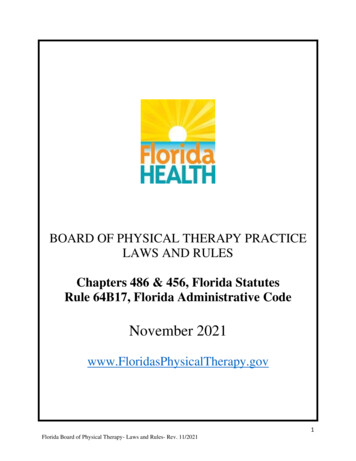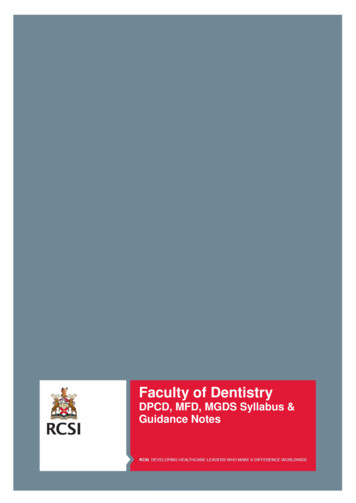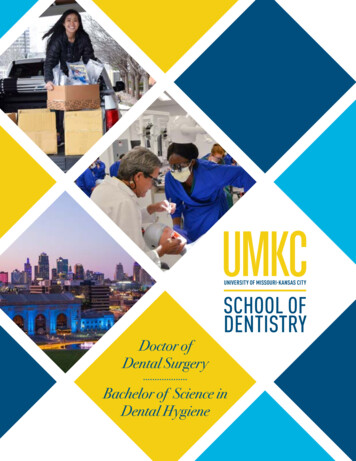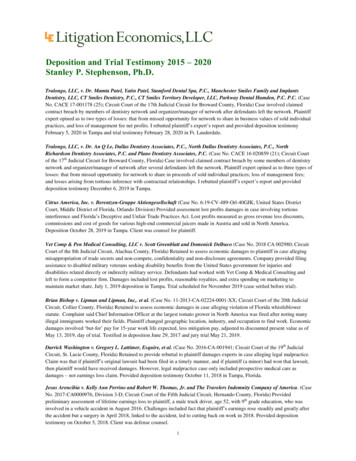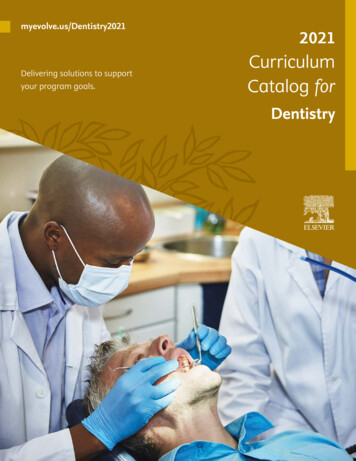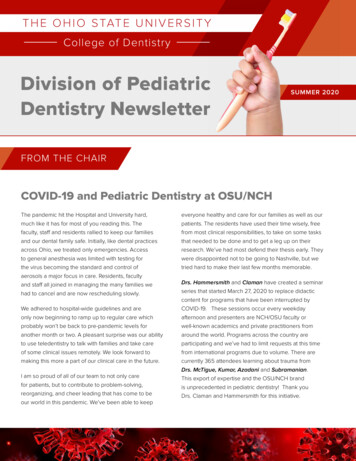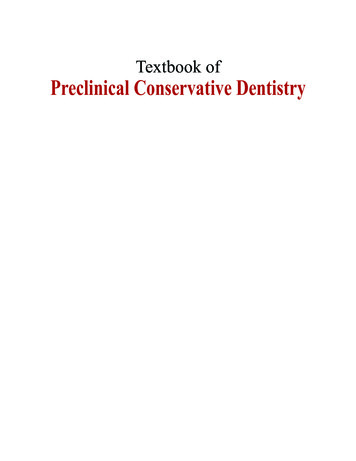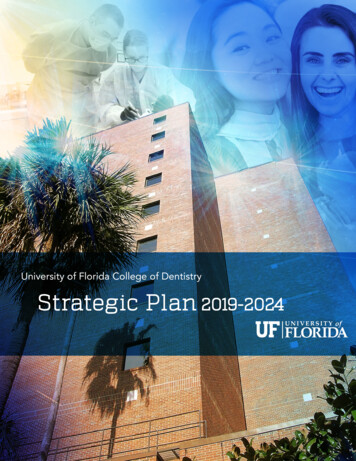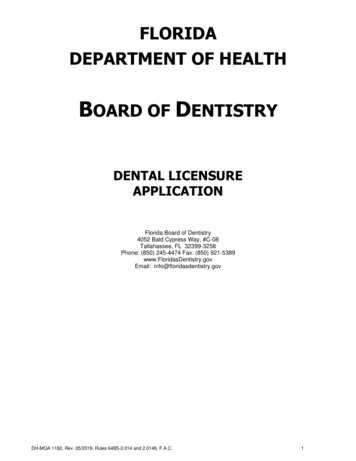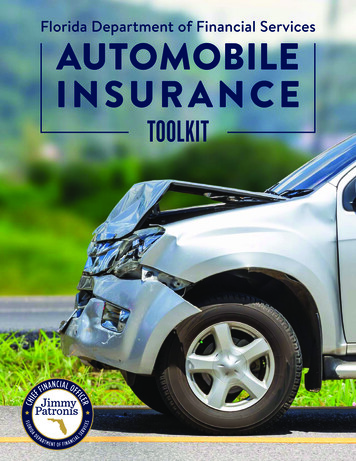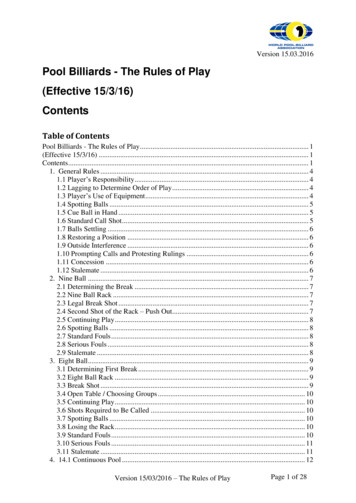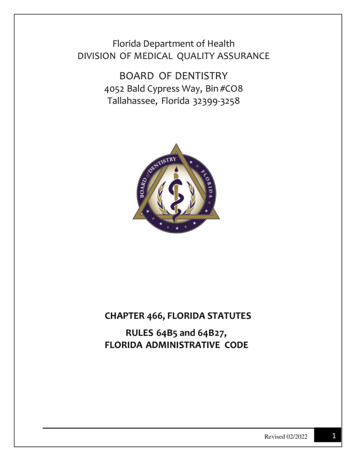
Transcription
Florida Department of HealthDIVISION OF MEDICAL QUALITY ASSURANCEBOARD OF DENTISTRY4052 Bald Cypress Way, Bin #CO8Tallahassee, Florida 32399-3258CHAPTER 466, FLORIDA STATUTESRULES 64B5 and 64B27,FLORIDA ADMINISTRATIVE CODERevised 02/20221
DENTISTRYwww.floridasdentistry.govTABLE OF CONTENTSINTRODUCTION . Page 3CHAPTER 466, FLORIDA STATUTES . .Page 4RULE 64B5, FLORIDA ADMINISTRATIVE CODE . .Page 38RULE 64B27, FLORIDA ADMINISTRATIVE CODE . .Page 132Revised 02/20222
INTRODUCTIONThe purpose of this booklet is to assemble and/or identify in one place the Florida laws and rules towhich the Board of Dentistry, the Department of Health and Florida licensed dentists and dentalhygienists must adhere.All of the Florida statutes and administrative rules mentioned in this introduction are not included in thisbooklet but are easily obtained on request. (Those in bold are included.)Chapter 466, Florida Statutes, is the law which governs the practice of dentistry in the State of Florida.In addition to the law, the Board promulgates rules to further define the mandate of the law.Chapter 64B5 (formerly 59Q), Florida Administrative Code, includes the rules promulgated by theBoard of Dentistry. The Board is required by law to promulgate certain rules to implement specificmandates with Florida Statutes, Chapters 466, 455, and 120, and the Board has specific authority topromulgate other rules within these statutes so long as the rules are not inconsistent with the laws.Chapter 456, Florida Statutes, is the law that governs the Department of Health. Within Chapter 456, theDepartment’s and the Board’s scopes interrelate and intertwine and the Board must/may promulgaterules in order for the Department to carry pit the mandate of the law.Chapter 120, Florida Statutes, is the Administrative Procedures Act. The purpose of the act is to ensurethat the general public has access to information regarding the functions and duties of administrativebodies, e.g. Board of Dentistry and Department of Health, whose actions may affect the interests ofprivate citizens.Under Chapter 120, The Administration Commission (the Governor and Cabinet) has adopted model rules(Chapter 28) by which agencies are required to abide when dealing with rulemaking and hearingprocedures to the extent that each agency does not adopt a specific rule of procedure covering thesubject matter material contained in the model rules applicable to that agency.Complaints against a licensee (850) 245-4339Address for Board of Dentistry:Department of HealthBoard of Dentistry4052 Bald Cypress Way, Bin C-08Tallahassee, FL 32399Telephone: (850) 245-4474Facsimile: (850) 921-5389Email: info@floridasdentistry.govWebsite: www.floridasdentistry.govRevised 02/20223
CHAPTER 466DENTISTRY, DENTAL HYGIENE, AND DENTAL 466.041Legislative purpose and intent.Persons exempt from operation of chapter.Definitions.Board of Dentistry.Expert witness certificate.Examination of dentists.Regional licensure examinations.Application for health access dental license.Renewal of the health access dental license.Revocation of health access dental license.Repeal of a health access dental license.Examination of dental hygienists.Applicants for examination; medical malpractice insurance.Certification of foreign educational institutions.Reexamination.Licensure.Renewal of license.Continuing education; dentists.Continuing education; dental hygienists.Inactive status.License to be displayed.Prescription of drugs; anesthesia.Dentist of record; patient records.Advertising by dentists.Retention of dental laboratories by dentist; penalty.Peer review; records; immunity; confidentiality.Dental hygienists; scope and area of practice.Dental charting.Delegation of duties; expanded functions.Permitting of dental interns serving at state institutions; certification of dentists practicing atgovernment facilities; permitting of nonprofit corporations.Prohibitions; penalties.Sexual misconduct.Lawful investigations; consent handwriting samples; mental or physical examination.Establishment of practitioner profile for designation as a controlled substance prescribingpractitioner.Grounds for disciplinary action; action by the board.Specialties.Proprietorship by nondentists.Dental laboratories.Registration.Registration certificates.Change of ownership or address.Advertising.Information; periodic inspections; equipment and supplies.Suspension and revocation; administrative fine.Rules.Violations.Hepatitis B carriers.Revised 02/20224
466.001 Legislative purpose and intent.—The legislative purpose for enacting this chapter is toensure that every dentist or dental hygienist practicing in this state meets minimum requirements for safepractice without undue clinical interference by persons not licensed under this chapter. It is the legislativeintent that dental services be provided only in accordance with the provisions of this chapter and not bedelegated to unauthorized individuals. It is the further legislative intent that dentists and dentalhygienists who fall below minimum competency or who otherwise present a danger to the public shall beprohibited from practicing in this state. All provisions of this chapter relating to the practice of dentistryand dental hygiene shall be liberally construed to carry out such purpose and intent.History.—ss. 1, 3, ch. 79-330; ss. 2, 3, ch. 81-318; ss. 1, 23, 24, ch. 86-291; s. 60, ch. 91-137; s. 7, ch.91-156; s. 4, ch. 91-429; s. 1, ch. 97-67.466.002 Persons exempt from operation of chapter.—Nothing in this chapter shall apply to thefollowing practices, acts, and operations:(1) The practice of her or his profession including surgical procedures involving the oral cavity by aphysician or surgeon licensed as such under the laws of this state.(2) A qualified anesthetist giving an anesthetic for a dental operation under the direct supervision of alicensed dentist.(3) The practice of dentistry in the discharge of their official duties by graduate dentists or dentalsurgeons in the United States Army, Air Force, Marines, Navy, Public Health Service, Coast Guard, orUnited States Department of Veterans Affairs.(4) The practice of dentistry by licensed dentists of other states or countries at meetings of dentalorganizations approved by the board, while appearing as clinicians.(5) Students in Florida schools of dentistry and dental hygiene or dental assistant educational programs,while performing regularly assigned work under the curriculum of such schools.(6) Instructors in Florida schools of dentistry, instructors in dental programs that prepare personsholding D.D.S. or D.M.D. degrees for certification by a specialty board and that are accredited in theUnited States by January 1, 2005, in the same manner as the board recognizes accreditation for Floridaschools of dentistry that are not otherwise affiliated with a Florida school of dentistry, or instructors inFlorida schools of dental hygiene or dental assistant educational programs, while performing regularlyassigned instructional duties under the curriculum of such schools. A full-time dental instructor at a dentalschool or dental program approved by the board may be allowed to practice dentistry at the teachingfacilities of such school or program, upon receiving a teaching permit issued by the board, in strictcompliance with such rules as are adopted by the board pertaining to the teaching permit and with theestablished rules and procedures of the dental school or program as recognized in this section.History.—ss. 1, 3, ch. 79-330; ss. 2, 3, ch. 81-318; ss. 2, 23, 24, ch. 86-291; s. 60, ch. 91-137; s. 7, ch.91-156; s. 4, ch. 91-429; s. 22, ch. 93-268; s. 2, ch. 94-104; s. 250, ch. 97-103; s. 1, ch. 2005-189.466.003 Definitions.—As used in this chapter:(1) “Board” means the Board of Dentistry.(2) “Dentist” means a person licensed to practice dentistry pursuant to this chapter.(3) “Dentistry” means the healing art which is concerned with the examination, diagnosis, treatmentplanning, and care of conditions within the human oral cavity and its adjacent tissues and structures. Itincludes the performance or attempted performance of any dental operation, or oral or oral-maxillofacialsurgery and any procedures adjunct thereto, including physical evaluation directly related to suchoperation or surgery pursuant to hospital rules and regulations. It also includes dental service of any kindgratuitously or for any remuneration paid, or to be paid, directly or indirectly, to any person or agency.The term “dentistry” shall also include the following:(a) The taking of an impression of the human tooth, teeth, or jaws directly or indirectly and by anymeans or method.(b) Supplying artificial substitutes for the natural teeth or furnishing, supplying, constructing,reproducing, or repairing any prosthetic denture, bridge, appliance, or any other structure designed to beworn in the human mouth except on the written work order of a duly licensed dentist.Revised 02/20225
(c) The placing of an appliance or structure in the human mouth or the adjusting or attempting toadjust the same.(d) Delivering the same to any person other than the dentist upon whose work order the work wasperformed.(e) Professing to the public by any method to furnish, supply, construct, reproduce, or repair anyprosthetic denture, bridge, appliance, or other structure designed to be worn in the human mouth.(f) Diagnosing, prescribing, or treating or professing to diagnose, prescribe, or treat disease, pain,deformity, deficiency, injury, or physical condition of the human teeth or jaws or oral-maxillofacial region.(g) Extracting or attempting to extract human teeth.(h) Correcting or attempting to correct malformations of teeth or of jaws.(i) Repairing or attempting to repair cavities in the human teeth.(4) “Dental hygiene” means the rendering of educational, preventive, and therapeutic dental servicespursuant to ss. 466.023 and 466.024 and any related extra-oral procedure required in the performance ofsuch services.(5) “Dental hygienist” means a person licensed to practice dental hygiene pursuant to this chapter.(6) “Dental assistant” means a person, other than a dental hygienist, who, under the supervision andauthorization of a dentist, provides dental care services directly to a patient. This term shall not include acertified registered nurse anesthetist licensed under part I of chapter 464.(7) “Department” means the Department of Health.(8) “Direct supervision” means supervision whereby a dentist diagnoses the condition to be treated, adentist authorizes the procedure to be performed, a dentist remains on the premises while theprocedures are performed, and a dentist approves the work performed before dismissal of the patient.(9) “Indirect supervision” means supervision whereby a dentist authorizes the procedure and a dentist ison the premises while the procedures are performed.(10) “General supervision” means supervision whereby a dentist authorizes the procedures which arebeing carried out but need not be present when the authorized procedures are being performed. Theauthorized procedures may also be performed at a place other than the dentist’s usual place of practice.The issuance of a written work authorization to a commercial dental laboratory by a dentist does notconstitute general supervision.(11) “Irremediable tasks” are those intraoral treatment tasks which, when performed, are irreversibleand create unalterable changes within the oral cavity or the contiguous structures or which cause anincreased risk to the patient. The administration of anesthetics other than topical anesthesia is consideredto be an “irremediable task” for purposes of this chapter.(12) “Remediable tasks” are those intraoral treatment tasks which are reversible and do not createunalterable changes within the oral cavity or the contiguous structures and which do not cause anincreased risk to the patient.(13) “Oral and maxillofacial surgery” means the specialty of dentistry involving diagnosis, surgery, andadjunctive treatment of diseases, injuries, and defects involving the functional and esthetic aspects of thehard and soft tissues of the oral and maxillofacial regions. This term may not be construed to apply toany individual exempt under s. 466.002(1).(14) “Health access setting” means a program or an institution of the Department of Children andFamilies, the Department of Health, the Department of Juvenile Justice, a nonprofit community healthcenter, a Head Start center, a federally qualified health center or look-alike as defined by federal law, aschool-based prevention program, a clinic operated by an accredited college of dentistry, or an accrediteddental hygiene program in this state if such community service program or institution immediately reportsto the Board of Dentistry all violations of s. 466.027, s. 466.028, or other practice act or standard of careviolations related to the actions or inactions of a dentist, dental hygienist, or dental assistant engaged inthe delivery of dental care in such setting.(15) “School-based prevention program” means preventive oral health services offered at a school byone of the entities defined in subsection (14) or by a nonprofit organization that is exempt from federalincome taxation under s. 501(a) of the Internal Revenue Code, and described in s. 501(c)(3) of theInternal Revenue Code.Revised 02/20226
History.—ss. 1, 3, ch. 79-330; ss. 2, 3, ch. 81-318; ss. 3, 23, 24, ch. 86-291; s. 60, ch. 91-137; s. 7, ch.91-156; s. 4, ch. 91-429; s. 1, ch. 94-104; s. 126, ch. 94-218; s. 2, ch. 97-67; s. 107, ch. 97-264; s. 130,ch. 2000-318; s. 1, ch. 2008-64; s. 4, ch. 2011-95; s. 270, ch. 2014-19.466.004 Board of Dentistry.—(1) To carry out the provisions of this chapter, there is created within the department the Board ofDentistry consisting of 11 members who shall be appointed by the Governor and subject to confirmationby the Senate. Seven members of the board must be licensed dentists actively engaged in the clinicalpractice of dentistry in this state; two members must be licensed dental hygienists actively engaged inthe practice of dental hygiene in this state; and the remaining two members must be laypersons who arenot, and have never been, dentists, dental hygienists, or members of any closely related profession oroccupation. Each member of the board who is a licensed dentist must have been actively engaged in thepractice of dentistry primarily as a clinical practitioner for at least 5 years immediately preceding the dateof her or his appointment to the board and must remain primarily in clinical practice during allsubsequent periods of appointment to the board. Each member of the board who is connected in anyway with any dental college or community college must be in compliance with s. 456.007. At least onemember of the board must be 60 years of age or older. Members shall be appointed for 4-year terms, butmay serve no more than a total of 10 years.(2) To advise the board, it is the intent of the Legislature that councils be appointed as specified inparagraphs (a), (b), and (c). The department shall provide administrative support to the councils andshall provide public notice of meetings and agenda of the councils. Councils shall include at least oneboard member who shall chair the council and shall include nonboard members. All council members shallbe appointed by the board chair. Council members shall be appointed for 4-year terms, and all membersshall be eligible for reimbursement of expenses in the manner of board members.(a) A Council on Dental Hygiene shall be appointed by the board chair and shall include one dentalhygienist member of the board, who shall chair the council, one dental member of the board, and threedental hygienists who are actively engaged in the practice of dental hygiene in this state. In making theappointments, the chair shall consider recommendations from the Florida Dental Hygiene Association.The council shall meet at the request of the board chair, a majority of the members of the board, or thecouncil chair; however, the council must meet at least three times a year. The council is charged with theresponsibility of and shall meet for the purpose of developing rules and policies for recommendation tothe board, which the board shall consider, on matters pertaining to that part of dentistry consisting ofeducational, preventive, or therapeutic dental hygiene services; dental hygiene licensure, discipline, orregulation; and dental hygiene education. Rule and policy recommendations of the council shall beconsidered by the board at its next regularly scheduled meeting in the same manner in which it considersrule and policy recommendations from designated subcommittees of the board. Any rule or policyproposed by the board pertaining to the specified part of dentistry defined by this subsection shall bereferred to the council for a recommendation before final action by the board. The board may take finalaction on rules pertaining to the specified part of dentistry defined by this subsection without a councilrecommendation if the council fails to submit a recommendation in a timely fashion as prescribed by theboard.(b) A Council on Dental Assisting shall be appointed by the board chair and shall include one boardmember who shall chair the council and three dental assistants who are actively engaged in dentalassisting. The council shall meet at the request of the board chair or a majority of the members of theboard. The council shall meet for the purpose of developing recommendations to the board on matterspertaining to that part of dentistry related to dental assisting.(c) With the concurrence of the State Surgeon General, the board chair may create and abolish otheradvisory councils relating to dental subjects, including, but not limited to: examinations, access to dentalcare, indigent care, nursing home and institutional care, public health, disciplinary guidelines, and othersubjects as appropriate. Such councils shall be appointed by the board chair and shall include at least oneboard member who shall serve as chair.(3) The board shall maintain its headquarters in Tallahassee.Revised 02/20227
(4) The board is authorized to adopt rules pursuant to ss. 120.536(1) and 120.54 to implement theprovisions of this chapter and chapter 456, including the establishment of a fee to defray the cost ofduplicating any license certification or permit, not to exceed 10 per duplication.(5) The board is authorized to publish and distribute such pamphlets, newsletters, and otherpublications as are reasonably necessary.(6) All provisions of chapter 456 relating to the board shall apply.History.—ss. 1, 3, ch. 79-330; ss. 2, 3, ch. 81-318; ss. 4, 23, 24, ch. 86-291; s. 17, ch. 87-172; s. 47, ch.90-228; s. 1, ch. 90-341; s. 60, ch. 91-137; s. 7, ch. 91-156; s. 4, ch. 91-429; s. 97, ch. 92-149; s. 127,ch. 94-218; s. 1, ch. 96-281; s. 1107, ch. 97-103; s. 69, ch. 98-166; s. 128, ch. 98-200; s. 55, ch. 99-5;s. 1, ch. 99-183; s. 1, ch. 2000-115; s. 128, ch. 2000-160; s. 2, ch. 2005-189; s. 55, ch. 2006-1; s. 85,ch. 2008-6.466.005 Expert witness certificate.—(1)(a) The department shall issue a certificate authorizing a dentist who holds an active and validlicense to practice dentistry in another state or a province of Canada to provide expert testimony in thisstate, if the dentist submits to the department:1. A complete registration application containing the dentist’s legal name, mailing address, telephonenumber, business locations, the names of the jurisdictions where the dentist holds an active and validlicense to practice dentistry, and the license number or other identifying number issued to the dentist bythe jurisdiction’s licensing entity; and2. An application fee of 50.(b) The department shall approve an application for an expert witness certificate within 10 businessdays after receipt of the completed application and payment of the application fee if the applicant holdsan active and valid license to practice dentistry in another state or a province of Canada and has not hada previous expert witness certificate revoked by the board. An application is approved by default if thedepartment does not act upon the application within the required period. A dentist must notify thedepartment in writing of his or her intent to rely on a certificate approved by default.(c) An expert witness certificate is valid for 2 years after the date of issuance.(2) An expert witness certificate authorizes the dentist to whom the certificate is issued to do only thefollowing:(a) Provide a verified written medical expert opinion as provided in s. 766.203.(b) Provide expert testimony about the prevailing professional standard of care in connection withmedical negligence litigation pending in this state against a dentist licensed under this chapter.(3) An expert witness certificate does not authorize a dentist to engage in the practice of dentistry asdefined in s. 466.003. A dentist issued a certificate under this section who does not otherwise practicedentistry in this state is not required to obtain a license under this chapter or pay any license fees. Anexpert witness certificate shall be treated as a license in any disciplinary action, and the holder of anexpert witness certificate shall be subject to discipline by the board.History.—s. 6, ch. 2011-233.466.006 Examination of dentists.—(1)(a) It is the intent of the Legislature to reduce the costs associated with an independent statedeveloped practical or clinical examination to measure an applicant’s ability to practice the profession ofdentistry and to use the American Dental Licensing Examination developed by the American Board ofDental Examiners, Inc., in lieu of an independent state-developed practical or clinical examination. TheLegislature finds that the American Dental Licensing Examination, in both its structure and function,consistently meets generally accepted testing standards and has been found, as it is currently organizedand operating, to adequately and reliably measure an applicant’s ability to practice the profession ofdentistry.(b) Any person desiring to be licensed as a dentist shall apply to the department to take the licensureexaminations and shall verify the information required on the application by oath. The application shallinclude two recent photographs. There shall be an application fee set by the board not to exceed 100which shall be nonrefundable. There shall also be an examination fee set by the board, which shall notexceed 425 plus the actual per applicant cost to the department for purchase of some or all of theRevised 02/20228
examination from the American Board of Dental Examiners or its successor entity, if any, provided theboard finds the successor entity’s clinical examination complies with the provisions of this section. Theexamination fee may be refundable if the applicant is found ineligible to take the examinations.(2) An applicant shall be entitled to take the examinations required in this section to practice dentistry inthis state if the applicant:(a) Is 18 years of age or older.(b)1. Is a graduate of a dental school accredited by the American Dental Association Commission onDental Accreditation or its successor entity, if any, or any other dental accrediting entity recognized bythe United States Department of Education; or2. Is a dental student in the final year of a program at such an accredited dental school who hascompleted all the coursework necessary to prepare the student to perform the clinical and diagnosticprocedures required to pass the examinations. With respect to a dental student in the final year of aprogram at a dental school, a passing score on the examinations is valid for 365 days after the date theexaminations were completed. A dental school student who takes the licensure examinations during thestudent’s final year of an approved dental school must have graduated before being certified for licensurepursuant to s. 466.011.(c)1. Has successfully completed the National Board of Dental Examiners dental examination; or2. Has an active health access dental license in this state; anda. The applicant has at least 5,000 hours within 4 consecutive years of clinical practice experienceproviding direct patient care in a health access setting as defined in s. 466.003; the applicant is a retiredveteran dentist of any branch of the United States Armed Services who has practiced dentistry while onactive duty and has at least 3,000 hours within 3 consecutive years of clinical practice experienceproviding direct patient care in a health access setting as defined in s. 466.003; or the applicant hasprovided a portion of his or her salaried time teaching health profession students in any public educationsetting, including, but not limited to, a community college, college, or university, and has at least 3,000hours within 3 consecutive years of clinical practice experience providing direct patient care in a healthaccess setting as defined in s. 466.003;b. The applicant has not been disciplined by the board, except for citation offenses or minor violations;c. The applicant has not filed a report pursuant to s. 456.049; andd. The applicant has not been convicted of or pled nolo contendere to, regardless of adjudication, anyfelony or misdemeanor related to the practice of a health care profession.(3) If an applicant is a graduate of a dental college or school not accredited in accordance withparagraph (2)(b) or of a dental college or school not approved by the board, the applicant is not entitledto take the examinations required in this section to practice dentistry until she or he satisfies one of thefollowing:(a) Completes a program of study, as defined by the board by rule, at an accredited American dentalschool and demonstrates receipt of a D.D.S. or D.M.D. from said school; or(b) Submits proof of having successfully completed at least 2 consecutive academic years at a full-timesupplemental general dentistry program accredited by the American Dental Association Commission onDental Accreditation. This program must provide didactic and clinical education at the level of a D.D.S. orD.M.D. program accredited by the American Dental Association Commission on Dental Accreditation. Forpurposes of this paragraph, a supplemental general dentistry program does not include an advancededucation program in a dental specialty.(4) Notwithstanding any other provision of law in chapter 456 pertaining to the clinical dental licensureexamination or national examinations, to be licensed as a dentist in this state, an applicant mustsuccessfully complete both of the following:(a) A written examination on the laws and rules of the state regulating the practice of dentistry.(b) A practical or clinical examination, which must be the American Dental Licensing Examinationproduced by the American Board of Dental Examiners, Inc., or its successor entity, if any, that isadministered in this state, provided that the board has attained, and continues to maintain thereafter,representation on the board of directors of the American Board of Dental Examiners, the examinationdevelopment committee of the American Board of Dental Examiners, and such other committees of theAmerican Board of Dental Examiners as the board deems appropriate by rule to assure that the standardsestablished herein are maintained organizationally. A passing score on the American Dental LicensingRevised 02/20229
Examination administered in this state is valid for 365 days after the date the official examination resultsare published.1. As an alternative to such practical or clinical examination, an applicant may submit scores from anAmerican Dental Licensing Examination previously administered in a jurisdiction other than this state afterOctober 1, 2011, and such examination results shall be recognized as valid for the purpose of licensure inthis state. A passing score on the American Dental Licensing Examination administered out of state shallbe the same as the passing score for the American Dental Licensing Examination administered in thisstate. The examination results are valid for 365 days after the date the official examination results arepublished. The applicant must have completed the examination after October 1, 2011. This subparagraphmay not be given retroactive application.2. If the date of an applicant’s passing American Dental Licensing Examination scores from anexamination previously administered in a jurisdiction other than this state under subparagraph 1. is olderthan 365 days, such scores are nevertheless valid for the purpose of licensure in this state, but only if theapplicant demonstrates that all of the following additional standards have been met:a. The applicant completed the American Dental Licensing Examination after October 1, 2011. This subsubparagraph may not be given retroactive application;b. The applicant graduated from a dental school accredited by the American Dental AssociationCommission on Dental Accreditation or its successor entity, if any, or any other dental accreditingorganization recognized by the United States Department of Education. Provided, however, if theapplicant did not graduate from such a dental school, the applicant may submit proof of havingsuccessfully completed a full-time supplemental general dentistry program accredited by the AmericanDental Association Commission on Dental Accreditation of at least 2 consecutive academic years at suchaccredited spons
(1) “Board” means the Board of Dentistry. (2) “Dentist” means a person licensed to practice dentistry pursuant to this chapter. (3) “Dentistry” means the healing art which is concerned with the examination, diagnosis, treatment planning, and care of conditions within the human oral
